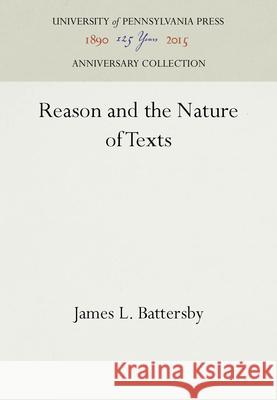Reason and the Nature of Texts » książka
Reason and the Nature of Texts
ISBN-13: 9780812233599 / Angielski / Twarda / 1996 / 216 str.
Many of today's most prominent critics and teachers of literature insist on the endless deferral of textual meaning and on the social construction of meaning and thought. Against these markers of current critical theory, James L. Battersby argues for the authorial construction of determinate textual meaning, insisting that to think about anything at all we must be able to refer to it, and that such references are, necessarily, the semantic consequences of an author's deliberate, intentional acts.Propelling Battersby's argument is his use of principles and arguments drawn from current philosophical literature on language and mind. Battersby reveals the philosophical shortcomings and argumentative weaknesses of some of the most prominent and influential doctrines in critical theory today--especially, and principally, those that inform and define postmodernism in both its linguistic and historicist/materialist modes. As he argues for a fresh conception of our understanding of language, mind, and meaning, Battersby probes the critical positions of, among others, Stanley Fish, Mikhail Bakhtin, Paul de Man, and Jacques Derrida.Making room for an alternative and, Battersby asserts, more intellectually appealing framework requires a skeptical dissection of the linguistic and historicist tenets that form the foundation of poststructuralism. The striking outcome of his effort is a book as lively, erudite, theoretically informed--and provocative--as his earlier Paradigms Regained.











